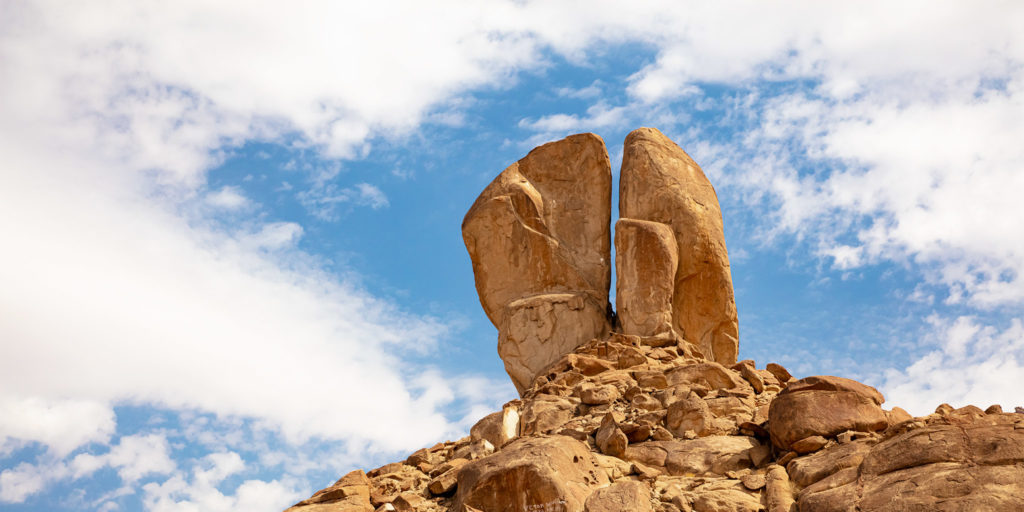Rephidim and the Split Rock of Horeb in Saudi Arabia

No Water at Rephidim
Thirsty. Parched, even. God had brought the Israelites safely
through the Red Sea after delivering them from slavery in Egypt. He had
provided pure, clean water for them at the Springs of Elim, and He miraculously
provided Manna for them to eat as they journeyed toward Mount Sinai and beyond,
but then, they “camped at Rephidim, and there was no water for the people to
drink” (Ex. 17:1b, NASB).[i]
And the multitudes were ready to kill Moses. Until he split the rock and water
came gushing out of it.
We read in Exodus 17:6-7 that God said to Moses,
“Behold, I will stand before you there on the rock at Horeb; and you shall strike the rock, and water will come out of it, that the people may drink.” And Moses did so in the sight of the elders of Israel. He named the place Massah and Meribah because of the quarrel of the sons of Israel, and because they tested the Lord, saying, “Is the Lord among us, or not?”[ii]

Splitting the Rock
God said that He would stand on the rock at Horeb, and He instructed Moses to strike the rock so that water would come out of it. This milestone in Israel’s history is cited again and again
throughout the scriptures. One such passage is Isaiah 48:21, which says, “He made the water flow out of the rock for them; He split the rock and the water gushed forth.”[iii]
Although scholars are (ahem) divided on just where Rephidim is and where this took place, one good candidate for the location is a towering Split Rock, not far from Jebel al Lawz, in modern-day Saudi Arabia. The fact that Moses named this location Massah seems to suggest that the Israelites were demanding a sign, just as the Pharisees later demanded that Jesus should show them a sign, a demand that Jesus responded to by calling them “an evil and adulterous generation.”[iv] The Israelites certainly seemed to get what they were asking for! And although Meribah seems to refer to the strife between the people and Moses, the Israelites had a much bigger problem coming their way: Amalekites.
Amalek was the grandson of Jacob’s brother, Esau. Hundreds of years before Moses led the Israelites out of Egypt, Esau had married some of the women native to Canaan, to the vexation of his mother,[v] and the Amalekites were thorns in Israel’s side for centuries afterward, beginning at Rephidim:
Then Amalek came and fought against Israel at Rephidim. … So it came about when Moses held his hand up, that Israel prevailed, and when he let his hand down, Amalek prevailed. But Moses’ hands were heavy. Then they took a stone and put it under him, and he sat on it; and Aaron and Hur supported his hands, one on one side and one on the other. Thus his hands were steady until the sun set. So Joshua overwhelmed
Amalek and his people with the edge of the sword.[vi]
Reference from the New Testament
The apostle Paul wrote to the believers in Corinth about these very events, with an
admonition to learn from them:
They (the Israelites) were drinking from a spiritual rock which followed them; and the rock was Christ. Nevertheless, with most of them God was not well-pleased; for they were laid low in the wilderness. Now these things happened as examples for us, so that we would not crave evil things as they also craved.[vii]
It certainly was not wrong for the Israelites to want water at Rephidim. Their attitude was the problem. They wanted God to prove Himself to them, even though He had already shown them amazing miracles in Egypt and through the Red Sea. He gave them what they asked for, but they got more than they bargained for! Amalekites for centuries to come!
However, the greatest lesson we can learn from these events is that God saved His people with water from a rock, and through an intercessor with outstretched hands (with a man on either side of him): object lessons to show His people the Living Water from Christ the Rock, whose body was broken for us, and whose outstretched arms on the cross demonstrated the greatest love anyone could ever know.
Written by Author: Jennifer Bartlett
Can you imagine yourself standing before the massive Split Rock at Horeb? We are blessed to offer tours of this majestic location that has been relatively untouched for thousands of years! View our upcoming Saudi Arabia tours and choose the adventure that's just right for you!
[i] New American Standard
Bible: 1995 Update (La Habra, CA: The Lockman
Foundation, 1995), Ex 17:1.
[ii]
Ibid, Ex 17:6–7.
[iii] New American Standard
Bible: 1995 Update (La Habra, CA: The Lockman
Foundation, 1995), Is 48:21.
[iv] Ibid,
Mt 12:39.
[v] See Genesis
27:46.
[vi] New American Standard
Bible: 1995 Update (La Habra, CA: The Lockman
Foundation, 1995), Ex 17:8–13.
[vii]
Ibid, 1 Co 10:4–6.




